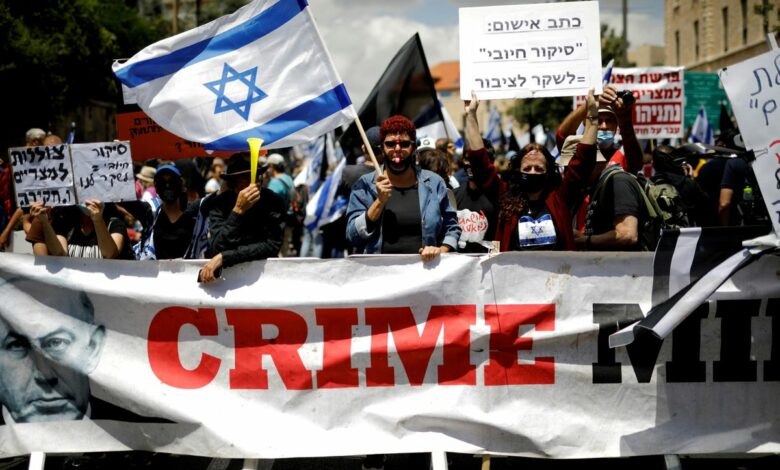
Long the familiar face of Israel, Benjamin Netanyahu has held on as prime minister for more than a decade, clinging to power through a criminal indictment and four elections in the past two years alone.
Now, the question is whether the 71-year-old Netanyahu, dubbed “the magician” by his admirers, has any cards left up his sleeve.
After years in which he exerted near-complete hegemony over Israeli politics, an emerging broad coalition of opponents could be about to unseat him.
“Fraud of the century,” an indignant Netanyahu declared on Sunday, after fellow right-winger Naftali Bennett turned against him and opted to align with centrist opposition chief Yair Lapid despite a public promise that he wouldn’t.
And while Netanyahu’s Likud party has remained unflinchingly loyal to him, Gideon Saar, a disillusioned Likud defector, is in line to join the new government-in-making as head of his own New Horizon party.
Israeli political commentators said the political knives have been out for a while for Netanyahu, the country’s longest-serving leader.
A sense that he was living on borrowed time after 12 consecutive years in office was compounded by a corruption trial now under way.
The cases involve alleged favours to media tycoons and illegal receipt of expensive cigars and champagne. Netanyahu has denied all wrongdoing and says, without offering any evidence, that he is a victim of a deep state conspiracy against him.
Don’t count him out yet, political commentators warn.
“It’s still too early to declare that (the) “Bibi era” of Israeli politics has ended. But if change is ultimately achieved, Netanyahu will have been toppled by his colleagues on the right, who had it with his leadership,” Aluf Benn, editor of the left-wing Haaretz newspaper, wrote on Monday.
GRACIOUS IN DEFEAT?
Popularly known by his childhood nickname, Bibi, Netanyahu is the son of a historian and attended high school and college in the United States, where his father taught.
Never lost for a soundbite, his booming baritone has
resounded on the world stage since serving as Israel’s ambassador to the United Nations from 1984 to 1988. Entering politics in Israel as a Likud legislator, he became party leader in 1993.
Netanyahu last lost the premiership, in his first term, before the turn of the millennium.
His gracious handover after a 1999 election to then-Labour Party leader Ehud Barak would seem almost impossible today, in the context of Netanyahu’s frequent social media sniping against his rivals.
At a changing of the guard in the prime minister’s office, Netanyahu and his wife Sara smiled as they shook hands with Barak and his spouse and chatted amiably with the couple with a glass of wine in their hands.
This time around, if Lapid meets a Wednesday deadline to form a new government – with Bennett slated to go first as prime minister in a “rotation” deal – Netanyahu will likely be ready to pounce as leader of the opposition.
In a possible taste of things to come, a stern-looking Netanyahu went on television on Monday to decry the creation of a “dangerous, left-wing government”.
The tone of his remarks – like “Fraud of the Century” – has unavoidable echoes of his closest international ally, himself now unseated, former US President Donald Trump.
The diverse composition of an alliance of left-wing, centrist and right-wing parties would make it particularly unstable in a country so riven by political divisions that “do-over” elections have become the norm.
But for Netanyahu’s loyalist voters, popularly dubbed “Bibists”, he remains a leader tough on security and a bulwark against pressure, even from Trump’s successor President Joe Biden, for any bold steps that could lead to a Palestinian state.
Pro-Netanyahu sentiment was still alive in southern Israel this month, even as the area again came under intensive rocket attack from Hamas in Gaza.
“Thank goodness we have a strong prime minister, Bibi Netanyahu,” one resident said, without a hint of sarcasm, on Israeli TV as he stood outside his parent’s home after it was hit for a second time by a rocket during 11 days of fighting.
___
Protesters wave an Israeli flag and hold placards as they stand behind a banner reading, “Crime Minister” and demonstrate against Israeli Prime Minister Benjamin Netanyahu just before his corruption trial opens, outside his residence in Jerusalem May 24, 2020. The placard in Hebrew reads, ” Indictment: favorable coverage = lying to the public”



